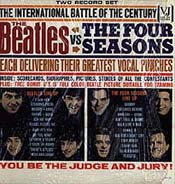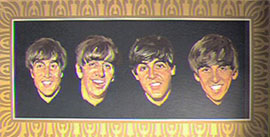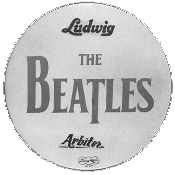 |
on |
 |
The History of the Beatles'
Record Releases on Vee Jay Records 1963 - 1987
Including a brief history of Vee Jay Records 1953 - 1987
sponsored by:
The Anthology of The Beatles Records
by Alex Bagirov
More than 1300 pages, more than 400 color photos! Complete discography from 1962 till our days! Some records have been documented for the first time! New countries have been added to the discography: Belarus, Uzbekistan, Republic of Geaorgia, Latvia.
Vee Jay Records was the most successful
Black owned and operated record company before Motown. Founded in 1953 by Vivian Carter
(the "Vee") and her husband, James (Jimmy) Bracken (the "Jay") in
Gary, Indiana, Vee Jay contributed a tremendous catalog of blues, rhythm and blues,
doo-wop, jazz, soul, pop, and rock n' roll music. The label started as an outgrowth of the
Bracken's successful record shop, and Vivian's stint as a disc jockey at WGRY in Gary. The
black music Vivian was
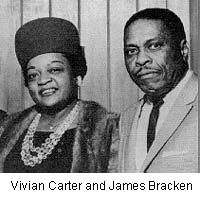 playing on her radio show at the time was
not generally available on records. The Brackens decided to start recording some of these
artists, and Vee Jay was born. The couple felt that they could get a label together that
could get radio play and sales through their broadcasting and retail contacts. The first
artists signed to the label were the Spaniels and Jimmy Reed. In a 1981 interview, first
published in Goldmine, Calvin Carter, Vivian's brother, said "Vivian and Jimmy
borrowed $500 to produce the first record, borrowed it from a pawnshop. The pawnbroker's
name was Maurice Tepper."
playing on her radio show at the time was
not generally available on records. The Brackens decided to start recording some of these
artists, and Vee Jay was born. The couple felt that they could get a label together that
could get radio play and sales through their broadcasting and retail contacts. The first
artists signed to the label were the Spaniels and Jimmy Reed. In a 1981 interview, first
published in Goldmine, Calvin Carter, Vivian's brother, said "Vivian and Jimmy
borrowed $500 to produce the first record, borrowed it from a pawnshop. The pawnbroker's
name was Maurice Tepper."
The first Vee Jay sessions by Jimmy Reed and the Spaniels were held with an eye toward release in June 1953. While the Bracken's arranged their distribution channels, these first Vee Jay singles were issued on Art Sheridan's Chance label. By December, both titles appeared with the Vee Jay imprint, and the label was up and running. It wasn't until the 1955 hiring of Ewart Abner Jr., a shrewd black record executive, that Vee Jay was catapulted into the big leagues. Rather than cater exclusively to blacks, Abner aimed to make Vee Jay a "full line" label.
Bluesman Jimmy Reed became the most consistent seller on the label. His easy going style regularly showed up on both the R&B and pop charts with songs such as 'Bright Lights, Big City' and 'You Don't Have To Go'. The Vee Jay catalog holds many more blues recordings by Eddie Taylor, Billy Boy Arnold, Snooky Pryor, John Lee Hooker, Big Joe Williams, Floyd Jones, Pee Wee Crayton, J.B. Lenoir and Elmore James.
With the addition of Calvin Carter as chief A&R man (promoter), the label didn't limit itself to blues, issuing numerous pop and R&B crossover hits by Gene Chandler ('The Duke Of Earl'), Dee Clark ('Raindrops'), Jerry Butler and the Impressions ('For Your Precious Love'), The Spaniels ('Goodnight Sweetheart Goodnight'), Betty Everett ('The Shoop Shoop Song'), Roscoe Gordon ('Just A Little Bit'), the El Dorados ('Crazy Little Mama') and the Dells ('Oh What A Night').
The label even regularly issued jazz albums by Wynton Kelly, Wayne Shorter, Eddie Harris, Lee Morgan, and gospel with the early recordings of the Staple Singers, the Highway QC's, the Original Five Blind Boys, the Harmonizing Four, the Caravans, the Gospel Harmonettes and the Swan Silvertones among them. Young unknowns David Gates (of Bread), Hoyt Axton and Jimi Hendrix briefly appeared on the label, as did Little Richard. As a result, Vee Jay attained national attention in September of 1962, with the smash hit song 'Sherry' by the Four Seasons. This group would go on to have 10 top 40 hits for the label.
Vee Jay was now being noticed as a potent force within the record industry. EMI, the British record company with ties to the U.S. Capitol label, approached Vee Jay in Summer 1962 after Capitol had used their right of first refusal to turn down a couple of artists EMI had offered. The Beatles at that time had yet to record 'Love Me Do', which was their first real British hit, and the decision to pass them up was made on the strength of several German recordings with Tony Sheridan, and a few items like 'Ain't She Sweet' and 'My Bonnie'.
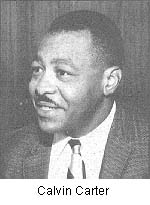 According to Calvin Carter, "At the
time, we were pretty hot. We had the Four Seasons and we got a lot of airplay. There was a
#1 record over in England at the time, and our lawyer, who represented us in other
countries, was Paul Marshall. Trans-Global (an EMI affiliate), a company over there had a
#1 record and they asked us if we wanted it, and of course we wanted it. It was 'I
Remember You,' by Frank Ifield. We took the record, and as a throw in, they had a group
and asked us if we would take them, too. The group turned out to be the Beatles, and we
got a five-year contract on the Beatles as a pickup on the Frank Ifield contract."
According to Calvin Carter, "At the
time, we were pretty hot. We had the Four Seasons and we got a lot of airplay. There was a
#1 record over in England at the time, and our lawyer, who represented us in other
countries, was Paul Marshall. Trans-Global (an EMI affiliate), a company over there had a
#1 record and they asked us if we wanted it, and of course we wanted it. It was 'I
Remember You,' by Frank Ifield. We took the record, and as a throw in, they had a group
and asked us if we would take them, too. The group turned out to be the Beatles, and we
got a five-year contract on the Beatles as a pickup on the Frank Ifield contract."
The Beatles recorded 'Love Me Do' in September 1962, a few weeks after the deal that contracted the group to Vee Jay, and the single hovered in the twenties of the English charts from November to January. The Beatles' next single, 'Please Please Me' / 'Ask Me Why', hit #1 in March 1963. When it hit #2 in early February, Vee Jay decided to release the single in the US, which they did on 25 February 1963 (VJ 498). The song did get some airplay from Chicago top 40 giant WLS, and was placed on their top 40 charts for two weeks, making it the first local top 40 appearance for the group in the US. The group was such an unknown that their name was misspelled "Beattles" on the record label and the top 40 charts.
The single slipped into obscurity soon after its release. This 45 however, was the first true Beatles single to be released in the U.S. The Decca single, 'My Bonnie' / 'The Saints' (Decca 31382) released in early 1962 merely features the Beatles as a backup group to Tony Sheridan.
In the Spring of 1963, some odd rumors started going around within the industry that Vee Jay was in financial trouble, and that they weren't paying the Four Seasons all of their royalties. Part of the trouble was that even though Vee Jay had exploded with several million sellers in 1962, the company was to a large extent still being run like it had been when it was a small business. Many of the financial records, were being kept in Ewart Abner's head, and there was question as to how well these records were being kept. As the Four Seasons situation became more and more tense over the summer, the Brackens decided to make a change in management.
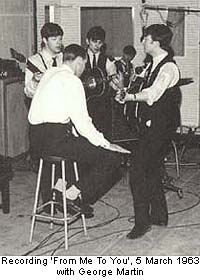 The Beatles' third British
single, 'From Me To You', dashed up the English charts with astonishing speed, making #1
in only three weeks and staying there for six straight weeks. News items in the trade
magazines such as Billboard began to indicate that something was happening over there that
may be interesting. Vee Jay released the single as 'From Me To You' / 'Thank You Girl' (VJ
522) on 27 May 1963. The single was made 'Pick Of the Week' by Cash Box magazine, but it
ran into cover problems!
The Beatles' third British
single, 'From Me To You', dashed up the English charts with astonishing speed, making #1
in only three weeks and staying there for six straight weeks. News items in the trade
magazines such as Billboard began to indicate that something was happening over there that
may be interesting. Vee Jay released the single as 'From Me To You' / 'Thank You Girl' (VJ
522) on 27 May 1963. The single was made 'Pick Of the Week' by Cash Box magazine, but it
ran into cover problems!
Del Shannon, who by that time had had a string of U.S. hits, heard the Beatles do 'From Me To You' during an English tour, and promptly recorded it for U.S. audiences. The Shannon version sold unevenly, but the Beatles disc barely sold at all. In Chicago, Vee Jay's base of operations, the major top 40 stations, WLS and WJJD, were on the Del Shannon single, and it easily made the top 20. Vee Jay couldn't get the Beatles' version on these stations, although the Beatles did get substantial airplay on some secondary Chicago stations, such as WYNR. Nationwide, the airplay on the Beatles' version of 'From Me To You' was only enough to push it to #116 in Billboard, with this peak coming about 10 August 1963, mainly due to popularity in the Los Angeles area. But by then, Vee Jay was in the middle of a major management crisis.
On 3 August1963, Billboard announced, "A major executive shakeup occurred at Vee Jay Records this week when President Ewart Abner, Jr., public relations chief Barbara Gardner, and promotion and A&R head Bill Sheppard, exited the firm."
It took Vee Jay several weeks to name a new president, and during this interim period, several critical events took place which would affect the company's future. In the confusion, EMI, through Trans-Global asked for a release on Frank Ifield. Calvin Carter remembers, "When we got into a little financial trouble with the Four Seasons, the word passed through the grapevine in the industry that we were in trouble, and EMI asked for a release on the Frank Ifield contract. So we granted their release." This release was apparently granted on 8 August 1963. At that time a new Frank Ifield single was set to be released as Vee Jay 2674 according to a Billboard review on 17 August. A week later, EMI had announced that it had given the disc to Vee Jay by mistake, and that the record would actually be on Capitol. But the Frank Ifield departure had larger implications.
Calvin Carter: "During that time, Ewart Abner left the company and we brought a new management team in, and they were at first under the impression that we had also released the Beatles. But we didn't. EMI claimed they sent us some kind of mysterious telegram, but they never could find the telegram. We were also set to release an album by the Beatles about that time, 'Introducing The Beatles' (VJLP 1062), but we had too many items in our catalog already, and the distributors were complaining. So we eliminated some of these albums we were set to release, and the Beatles album was one of them, because the Beatles just did not sell very well the first time around. I kept the Beatles album in my desk drawer for several months after that."
The last minute cancellation of several albums in the new Fall Catalog just added to the general confusion at Vee Jay during that period.
The other significant event which occurred during the weeks between Vee Jay presidents was that the Four Seasons situation blew up. New contract or no new contract, on 13 August, the Four Seasons filed suit against Genius, Inc. for Vee Jay's nonpayment of royalties. The Four Seasons were technically not under contract to Vee Jay, but to Genius. Genius had the contract with Vee Jay, so the group had to sue Genius and Genius had to sue the label. The firm served notice on Vee Jay that they considered their contract to be void due to Vee Jay's not paying full royalties. This legal maneuvering went on until November, when it became obvious that the Four Seasons had already finished their new single, "Dawn (Go Away)," but were refusing to give it to Vee Jay, at which point Vee Jay countersued.
It was amidst this chaos that Randy Wood was named President of Vee Jay Records the last week in August 1963. Wood had been with Vee Jay since 1960, and had been a substantial force in the label's increased sales over 1960-63. Wood was to continue this excellent sales track record while he remained president of Vee Jay. Shortly thereafter, Jay Lasker was named Executive Vice-President, Calvin Carter was named Vice President in charge of A&R and Publishing, Steve Clark was named Vice President in charge of Sales, and Mark (Manny) Sands named Comptroller. This cast became the new "Executive Management Team" for Vee Jay, a new corporate structure hired to put Vee Jay more along the lines of a large record company, which it had obviously become.
Either because of Trans-Global's actions, or the Beatle's lack of success, the next single, 'She Loves You' / 'I'll Get You' (Swan 4152), was sent to the even smaller Swan label, which was founded in the late 1950's in Philadelphia, where it was issued on 16 September 1963, just after the UK single. Swan Records was best known for Freddy Cannon, whose most well-known hit was 'Tallahassee Lassie'. For a time, all Swan records carried the words "Don't Drop Out," which was a message to American teens to stay in school.
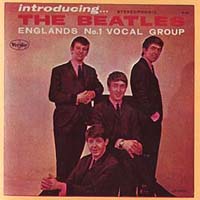 Still, Vee Jay decided to go ahead and issue the
Beatles first album, which had been available since March in the UK. Vee Jay titled the
album 'Introducing the Beatles' (VJLP 1062). In an unusual move, Vee Jay removed 'Please
Please Me' and 'Ask Me Why' from the record and added 'Love Me Do' and 'P.S. I Love You',
meaning that none of the songs on the album had been issued previously in the US. The
album was supposedly issued on 22 July 1963. In reality, although copies may have been
pressed early on, the album was not released until 1964.
Still, Vee Jay decided to go ahead and issue the
Beatles first album, which had been available since March in the UK. Vee Jay titled the
album 'Introducing the Beatles' (VJLP 1062). In an unusual move, Vee Jay removed 'Please
Please Me' and 'Ask Me Why' from the record and added 'Love Me Do' and 'P.S. I Love You',
meaning that none of the songs on the album had been issued previously in the US. The
album was supposedly issued on 22 July 1963. In reality, although copies may have been
pressed early on, the album was not released until 1964.
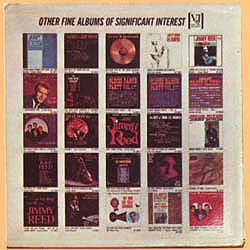 As a result of the two unsuccessful singles, Vee Jay
did very little to properly distribute and promote the album. The Chicago area, along with
the north eastern part of the US, were the areas that gave the LP the bulk of what little
success it had. The back cover pictures twenty five "other fine albums of significant
interest" by other Vee Jay artists such as Jimmy Reed, Jerry Butler, the Four
Seasons, and Frank Ifield. Apparently, Vee Jay was hesitant to list the actual song
titles.
As a result of the two unsuccessful singles, Vee Jay
did very little to properly distribute and promote the album. The Chicago area, along with
the north eastern part of the US, were the areas that gave the LP the bulk of what little
success it had. The back cover pictures twenty five "other fine albums of significant
interest" by other Vee Jay artists such as Jimmy Reed, Jerry Butler, the Four
Seasons, and Frank Ifield. Apparently, Vee Jay was hesitant to list the actual song
titles.
In late 1963, Capitol Records launched the largest promotional campaign in music history. The company allegedly spent $50,000 in the New York City area alone. "The Beatles Are Coming" was plastered everywhere. 'I Want To Hold Your Hand' / 'I Saw Her Standing There' (Capitol 5112) was released on 26 December 1963. The latter song was one already in possession of Vee Jay, since it was on their album. 'I Want To Hold Your Hand' hit the #1 spot in all three charts on 13 January 1964.
The new Vee Jay management team took a closer look at the contract arrangements, and were soon convinced that the label had not released the Beatles the previous summer. Consequently, they took the album out and sent it to the pressing plants and prepared for some sales. They also dusted off 'Please Please Me' and 'From Me To You' and paired them on a new single, VJ 581. Capitol was not amused, and on 15 January 1964, hit Vee Jay with an injunction against manufacturing, distributing, advertising, or otherwise disposing of records by the Beatles. And the legal chase began.
The management team had their work cut out for them. For the first time, Vee Jay was involved in a great number of lawsuits. Randy Wood later said, "At one point, we had no fewer than sixty- four legal actions going. It's frightening to think about it even now."
Calvin Carter added, "We put the album out, and EMI, through Capitol, sued us to cease and desist. They got an injunction against us seemingly every week. They would get an injunction against us on Monday, and we would get it off on Friday, then we'd press over the weekend and ship on Monday; we were smooth, we had everybody alerted, and we were pressing records all the time on the weekends."
Capitol contended in the suit that Vee Jay's rights to the Beatles had been canceled on 8 August 1963, for nonpayment of royalties. Calvin Carter stated, "They were trying to get us on something really minor like failure to declare royalties on 500 records we shipped in 1963. But that was not true at all."
A restraining order was placed on Vee Jay. Its managing director, Jay Lasker, said that they had ceased shipping Beatles products because of the order, but were going take legal action as they had a five year contract with the Beatles and were not in default for non-payment of royalties. The legal representatives of both Capitol and Vee Jay decided to settle the matter between themselves due to the complications which could arise from the suits. It was agreed that 'Introducing The Beatles' could be reissued if the two Ardmore & Beechwood tracks were removed.
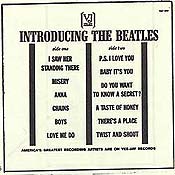 A second injunction was granted against Vee Jay
concerning the publishing rights on 'Love Me Do' and 'P.S. I Love You', two of the tunes
on the album. By mid-February, Vee Jay had won the first round with Capitol, whereby they
were allowed to press and distribute the Beatles single. The block remained against the
album, so Vee Jay took off the two cuts in question and substituted 'Please Please Me' and
'Ask Me Why' instead. The album was now legally clear, and Vee Jay shipped enormous
quantities of it in a very short time. By April, it was #2 on the LP charts.
A second injunction was granted against Vee Jay
concerning the publishing rights on 'Love Me Do' and 'P.S. I Love You', two of the tunes
on the album. By mid-February, Vee Jay had won the first round with Capitol, whereby they
were allowed to press and distribute the Beatles single. The block remained against the
album, so Vee Jay took off the two cuts in question and substituted 'Please Please Me' and
'Ask Me Why' instead. The album was now legally clear, and Vee Jay shipped enormous
quantities of it in a very short time. By April, it was #2 on the LP charts.
Also about this time, mid January 1964, 'She Loves You' (Swan 4152) was given a second pressing by Swan Records, including the addition of a picture sleeve. 'She Loves You' also hit Number One. Some of these have "Don't Drop Out" on the label, and some don't. Swan also issued a one sided promotional single featuring 'I'll Get You' (also numbered Swan 4152).
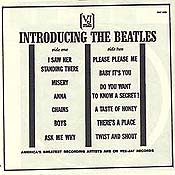 On 27 January 1964, Vee Jay re-released the
'Introducing The Beatles' (VJLP 1062) album, which reached #2 in the Billboard and Cash
Box charts and #1 in the Record World chart. This time the legally more acceptable 'Please
Please Me' and 'Ask Me Why' were in the place of 'Love Me Do' and 'P.S. I Love You'. The
back cover to this issue lists the song titles in two columns.
On 27 January 1964, Vee Jay re-released the
'Introducing The Beatles' (VJLP 1062) album, which reached #2 in the Billboard and Cash
Box charts and #1 in the Record World chart. This time the legally more acceptable 'Please
Please Me' and 'Ask Me Why' were in the place of 'Love Me Do' and 'P.S. I Love You'. The
back cover to this issue lists the song titles in two columns.
Three days later, on 30 January 1964, Vee Jay combined the 'A' sides of their two 1963 discs and released 'Please Please Me' / 'From Me To You', (VJ 581). Promotional copes were sent out with a special picture sleeve known as "The record that started Beatlemania" sleeve. This sleeve advertises the upcoming appearance by the Beatles on the Ed Sullivan show. The commercial record's appeal was boosted with a nice picture sleeve featuring the 'Introducing the Beatles' cover photo, and 'Please Please Me' reached #3 in all three trade charts.
 Calvin Carter again, "We finally made
something out of the court settlement, because we just couldn't afford to fight that big a
company. We kept what we had, and they had all future product. We were selling so many
Beatles records, we just couldn't afford to fight for the five year rights. At that point,
we had even got a ten year moratorium from our creditors on our outstanding bills, that
we'd just keep them coming. There was a lot of pressure on us. We sold in one month's time
about 2.6 million Beatles singles on Vee Jay and Tollie. Those were fantastic times. And
right in the middle of this, we moved from Chicago to Santa Monica, California. What a
mess, what a mess."
Calvin Carter again, "We finally made
something out of the court settlement, because we just couldn't afford to fight that big a
company. We kept what we had, and they had all future product. We were selling so many
Beatles records, we just couldn't afford to fight for the five year rights. At that point,
we had even got a ten year moratorium from our creditors on our outstanding bills, that
we'd just keep them coming. There was a lot of pressure on us. We sold in one month's time
about 2.6 million Beatles singles on Vee Jay and Tollie. Those were fantastic times. And
right in the middle of this, we moved from Chicago to Santa Monica, California. What a
mess, what a mess."
The move was made necessary because, except for Calvin Carter, the other members of the management team were all in Los Angeles. Although the main offices were on the west coast, most of the record pressing remained in Chicago and St. Louis, but due to the demand for both the album and single, much of the record production was subcontracted to various record pressing plants. This is why there are so many different label, logo, print, and color variations on Vee Jay's 1964 Beatle records, particularly the singles, although the albums had their share as well.
Without any hope of obtaining new Beatles material, which at this point was firmly in the hands of Capitol Records, Vee Jay wanted to take advantage of the limited number of Beatles tracks they had. Vee Jay then began what would become a small string of tactfully conceived records intended to entice the ever hungry public into believing they were purchasing brand new Beatles albums.
 The first release, 'Jolly What! The Beatles And Frank
Ifield On Stage' (VJ 1085), appeared on 26 February 1964. This LP was nothing more than a
compilation of the two Beatle singles released in early and mid 1963, and eight Frank
Ifield tracks, all studio recordings. Frank Ifield was best known for his version of 'I
Remember You'. Vee Jay tried to stimulate poor sales and chart action of the album by
changing the cover art to make a more appealing package to Beatle buyers. Dropping the
original art, featuring an old man with a Beatle haircut, Vee Jay used a full color Beatle
portrait in hopes of capturing more unsuspecting buyers. By the time the second covers
were released, the public had already rejected this rip off, and this version sold even
less than the original. The album only reached #104 in the charts.
The first release, 'Jolly What! The Beatles And Frank
Ifield On Stage' (VJ 1085), appeared on 26 February 1964. This LP was nothing more than a
compilation of the two Beatle singles released in early and mid 1963, and eight Frank
Ifield tracks, all studio recordings. Frank Ifield was best known for his version of 'I
Remember You'. Vee Jay tried to stimulate poor sales and chart action of the album by
changing the cover art to make a more appealing package to Beatle buyers. Dropping the
original art, featuring an old man with a Beatle haircut, Vee Jay used a full color Beatle
portrait in hopes of capturing more unsuspecting buyers. By the time the second covers
were released, the public had already rejected this rip off, and this version sold even
less than the original. The album only reached #104 in the charts.
Betty Chiappetta, a future owner of the company said, "Vee Jay started the Tollie label when they moved to California, with 'Twist and Shout' by the Beatles as the first record issued. The reason that they started this new label was that they had so many records that were getting airplay during that time that the radio stations were giving them a hard time. At one point, they had 14 of the top 100 on either Tollie or Vee Jay. So they started another label."
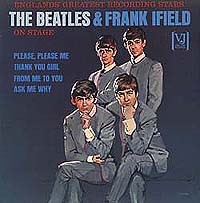 On 2 March 1964, Vee Jay introduced their new Tollie
label and issued the next Beatles single, 'Twist And Shout' / 'There's A Place' (Tollie
9001). Within a short time of its release, 'Twist And Shout' was perched near the top of
most charts reaching #2 in Billboard, and #1 in Record World and Cashbox.
On 2 March 1964, Vee Jay introduced their new Tollie
label and issued the next Beatles single, 'Twist And Shout' / 'There's A Place' (Tollie
9001). Within a short time of its release, 'Twist And Shout' was perched near the top of
most charts reaching #2 in Billboard, and #1 in Record World and Cashbox.
Vee Jay noticed how popular EPs were in Britain and decided to release four of the 'Introducing The Beatles' tracks ('Misery', 'Taste Of Honey', 'Ask Me Why', and 'Anna') as an EP, with a special cardboard cover, named 'Souvenir Of Their Visit To America' (VJEP 1-903). EPs weren't a popular format in America and were extremely rare. Initially, the EP was issued in a cardboard sleeve at the unusually high price of $1.29 on 23 March 1964. The record was quickly reissued in an ordinary paper sleeve at the usual price of a single and Vee Jay claimed that a million copies were sold. This is quite possible, even though the EP didn't register in any of the main charts. The magazines may not have included the EP in their chart figures since EPs weren't generally issued in America.
Later promo copies and some of the stock copies printed the song 'Ask Me Why' in bolder print than the other three. Obviously, this track was the one Vee Jay figured was strong enough to carry the EP to success. The promotional sleeve for the EP printed only 'Ask Me Why' and a rare promotional single was distributed as well. Both items however, were conceived far too late to save the dying record. Whether the format, the selections, or the fact that the public was satisfied by already having these songs on previous releases, this EP received little attention, and after this failure, Vee Jay didn't try the EP format again.
Vee Jay issued the single 'Do You Want To Know A Secret?' / 'Thank You Girl' (VJ 587) on 23 March 1964, the same day as the EP. The single and EP also used the same cover. The single went to #2 in Billboard and #3 in Cash Box and Record World.
Capitol Records was still applying heavy legal pressure which would ultimately force Vee Jay to relinquish all rights to their Beatles material. The battle between Vee Jay and Capitol was finally settled out of court on 9 April 1964, where "Vee Jay accepts a license from Capitol to sell its product, with Vee Jay paying Capitol royalties, including substantial payment for the Beatles royalties to date and a licensing fee for the future." Neither side conceded that the position of the other was right. Although the settlement was final, Vee Jay would retain the rights to the Beatles tracks that they had until actual forfeiture of the material in early 1965.
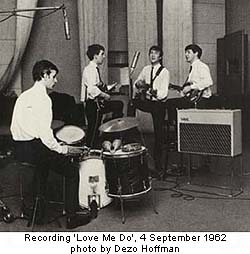 Having great success reissuing old material,
Vee Jay tried again on 27 April 1964, reissuing 'Love Me Do' / 'P.S. I Love You' (Tollie
9008). Although Vee Jay had lawsuits against them, they continued to press new records
furiously. 'Love Me Do' reached #1 in all three charts.
Having great success reissuing old material,
Vee Jay tried again on 27 April 1964, reissuing 'Love Me Do' / 'P.S. I Love You' (Tollie
9008). Although Vee Jay had lawsuits against them, they continued to press new records
furiously. 'Love Me Do' reached #1 in all three charts.
By this time, Capitol's 'The Beatles Second Album', featuring both sides of the 'She Loves You' single, was topping the charts. Since Swan's 'She Loves You' single was also selling well, they then issued the German version of the song, 'Sie Liebt Dich' / 'I'll Get You' (Swan 4182) on 21 May 1964. This had been recorded on 29 January 1964, just before the Beatles came to America. All 'Sie Liebt Dich' singles have "Don't Drop Out" on the label. The single just made it into Billboard's top 100 at #97, not bad for a foreign language record.
Vee Jay's legal problems didn't go away. Capitol considered that Vee Jay had violated their agreement by altering and repackaging 'Introducing The Beatles'. As a result, a trial without jury took place on 15 July 1964 in which Vee Jay pointed out that their 9 April 1964 license did not mention that they could not repackage the Beatle product they had. Capitol disagreed, saying that Vee Jay had breached the agreement by presenting the same album in different packaging.
On 23 July 1964, Judge Mervyn A. Aggeler announced: "The court finds in favor of Vee Jay Records on all the issues raised in their cross complaint. Vee Jay Records has the unqualified right to advertise and promote the covered masters in any cover, jacket or package which Vee Jay Records, Inc., deems appropriate. Vee Jay has the unqualified right to advertise, sell and promote the long playing album, in the type of jacket, a copy of which is attached to Vee Jay Records complaint, marked as Exhibit C."
"Capitol Records and Beechwood Music, Inc., are permanently restrained from declaring that promotion of the long playing record 'Introducing The Beatles', in the redesigned jacket, constitutes or will constitute a breach in contract, the License Agreement and Mechanical License contracts both dated April 9, 1964."
As a result, Vee Jay were allowed to release Beatles records they had masters of in any form until 15 October 1964. After that time, they no longer had the right to issue any Beatles product.
On 10 August 1964 Vee Jay issued four Beatles singles on their 'Oldies 45' label, but none of these reissues registered in the charts. They were 'Do You Want To Know A Secret?' / 'Thank You Girl' (OL 149), 'Please Please Me' / 'From Me To You' (OL 150), 'Love Me Do' / 'P.S. I Love You' (OL 151) and 'Twist And Shout' / 'There's A Place' (OL 152).
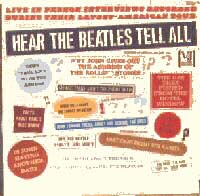 In September 1964, Vee Jay issued an album featuring
interviews with the Beatles and John Lennon. This album, 'Hear the Beatles Tell All' (VJ
PRO 202), consisted of Dave Hull interviewing all four Beatles, and Jim Steck speaking
with John. It was a Dunhill Production, with a score by Lou Adler and percussion done by
Hal Blaine. It proved to be the only album that Capitol could not control. Capitol
countered with the double LP 'The Beatles Story' (STBO-2222) on 23 November 1964.
In September 1964, Vee Jay issued an album featuring
interviews with the Beatles and John Lennon. This album, 'Hear the Beatles Tell All' (VJ
PRO 202), consisted of Dave Hull interviewing all four Beatles, and Jim Steck speaking
with John. It was a Dunhill Production, with a score by Lou Adler and percussion done by
Hal Blaine. It proved to be the only album that Capitol could not control. Capitol
countered with the double LP 'The Beatles Story' (STBO-2222) on 23 November 1964.
After a summer that musically belonged to Capitol and United
Artists, Vee Jay decided it was time for another Beatles package. Again utilizing their
tracks from 'Introducing the Beatles', Vee Jay repackaged them in a double album with 'The
Golden Hits of the Four Seasons' and issued 'The Beatles vs. The Four Seasons' (VJDX 30)
on 1 October 1964. The front cover featured new drawings of the Beatles and the Four
Seasons, plus listings of all the songs. The back cover featured a 'scorecard'. The album
was issued with a poster which featured the drawings of the Beatles from the VJ 587
picture sleeve. The album only reached #142 in the charts.
|
|
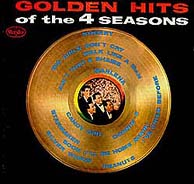 |
Undaunted, within two weeks Vee Jay issued yet another
repackaging of 'Introducing The Beatles' called 'Songs, Pictures And Stories Of The
Fabulous Beatles' (VJLP 1092) on 12 October 1964. This time the concept was that the buyer
could learn intimate facts about each of the Beatles, plus obtain even more photographs of
their heroes. The actual record used in
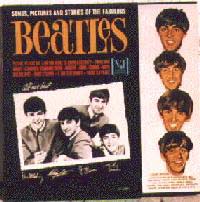 this and the previous repackage contained
'Introducing The Beatles' discs with their original title and catalog number. This album
fared somewhat better than the previous attempt, reaching #100 in Cash Box, #79 in Record
World and #63 in Billboard, but it wasn't long before the public was aware they were
buying the same album for the fourth time.
this and the previous repackage contained
'Introducing The Beatles' discs with their original title and catalog number. This album
fared somewhat better than the previous attempt, reaching #100 in Cash Box, #79 in Record
World and #63 in Billboard, but it wasn't long before the public was aware they were
buying the same album for the fourth time.
After this, Capitol Records legally took control of the 14 songs that Vee Jay had so tactfully stretched into four albums, six singles, four reissue singles, and one EP.
On 22 March 1965, Capitol released their own version of the Vee Jay material, without 'Misery' and 'There's a Place', on the LP, 'The Early Beatles' (ST 2309). Probably due to the fresh Capitol packaging, the public was willing to again spring for the same songs offered so repeatedly in 1964. Also, Capitol transferred Vee Jay's 'Oldies' singles to their own oldies label, Starline in August 1965.
After nearly two years of competing with the big boys in providing an ever hungry public with Beatles records, Vee Jay returned to distributing the rhythm and blues, pop and gospel that had been its lifeblood prior to the Beatles era. But, like so many other American independent labels during the British invasion, they found trouble at the bottom line. Vee Jay's collapse in 1965 was also precipitated by a battle Bracken and Carter fought with Abner over expansion, Abner's subsequent departure, the ill fated move to the west coast, and mounting debts. The company finally closed its doors in May 1966.
In the mid-seventies, Vee Jay surfaced again, mainly as a distributor for reissues of their 1950's and 1960's rhythm and blues material. In 1979, Vee Jay, now called Vee Jay International, re-released the only Beatles album that Capitol could not control, 'Hear The Beatles Tell All'. Vee Jay issued a shaped picture disc of this album in August 1987, finally ending their chapter in Beatles history.
Acknowledgments:
Frank Daniels, 1997
Cub Koda, All Music Guide, 1996
Bill Harry, The Ultimate Beatles Encyclopedia, 1992
Perry Cox and Mike Miller, The Beatles Price Guide 2nd Edition, 1986
Mike Callahan, The Vee Jay Story (with the Vee-Jay International Story) originally
published in Goldmine, May 1981.
Several of Mike's original interviewees have subsequently passed away, including both Vivian and Calvin Carter. Both Calvin Carter and Betty Chiappetta spent many hours on the phone with Mike Callahan, and are due his special thanks. Mike also thanks: Sid McCoy, Red Holloway, Lefty Bates, and Bill Sheppard. And for help in research or the discography: Foote Kirkpatrick, Robert Pruter, Wes Smith, Dick Lillard, Bud Buschardt, Steve Goddard, Jim Harkey, George Ferguson, Ned Stacey, and David Edwards.

